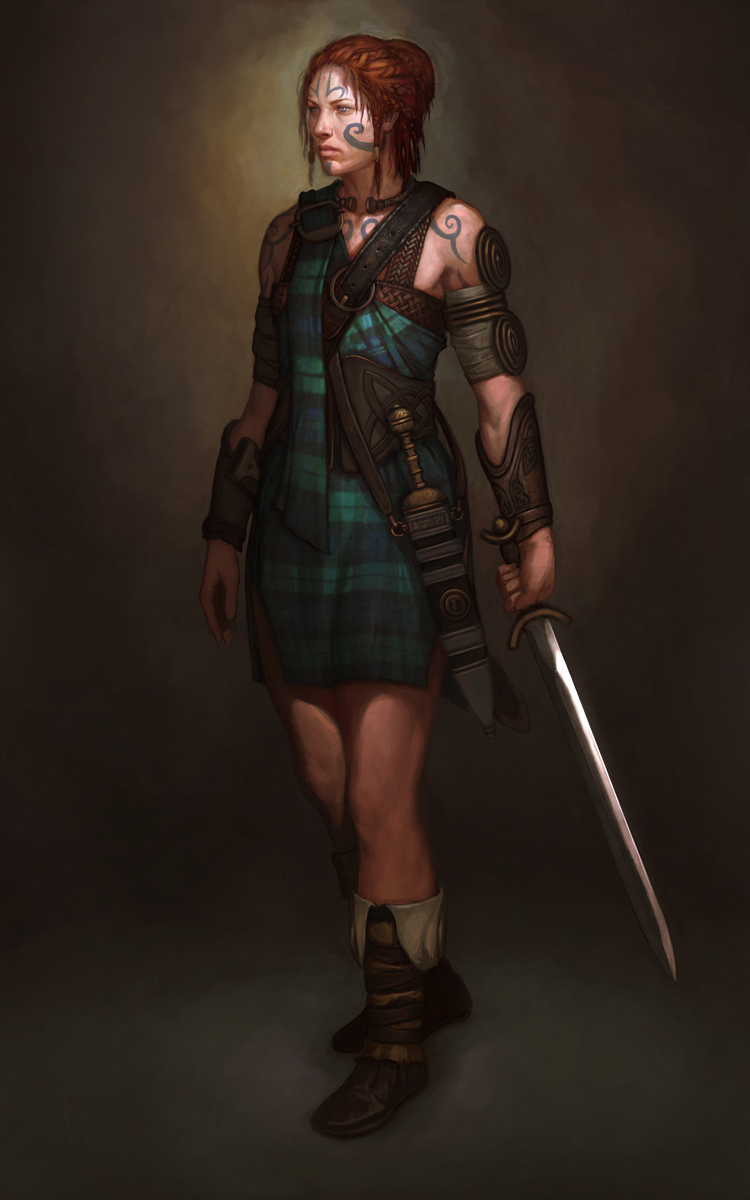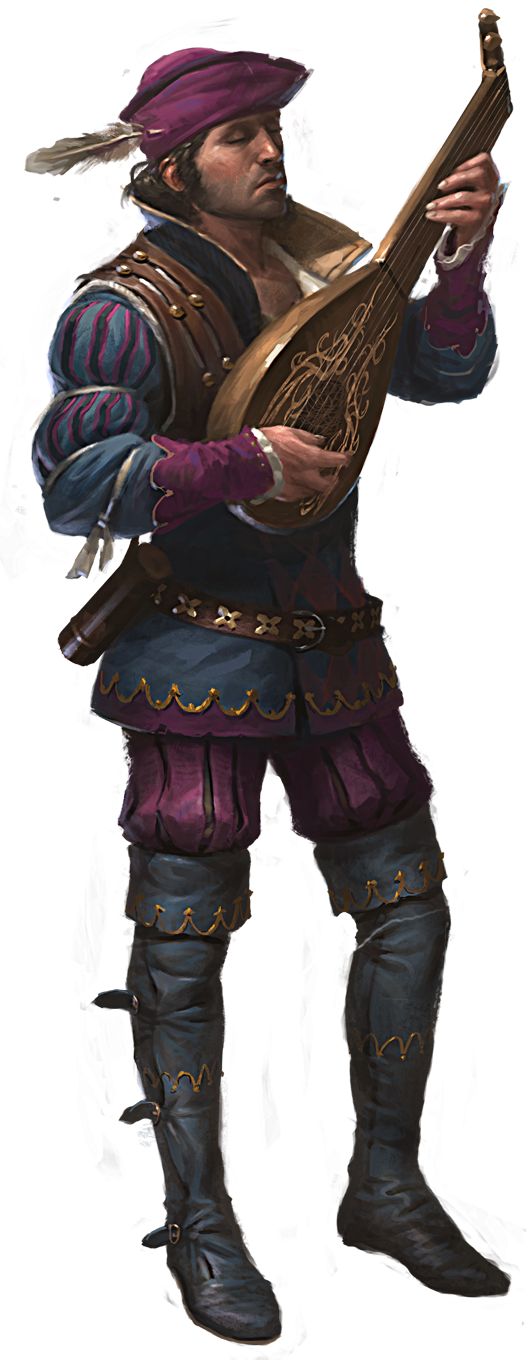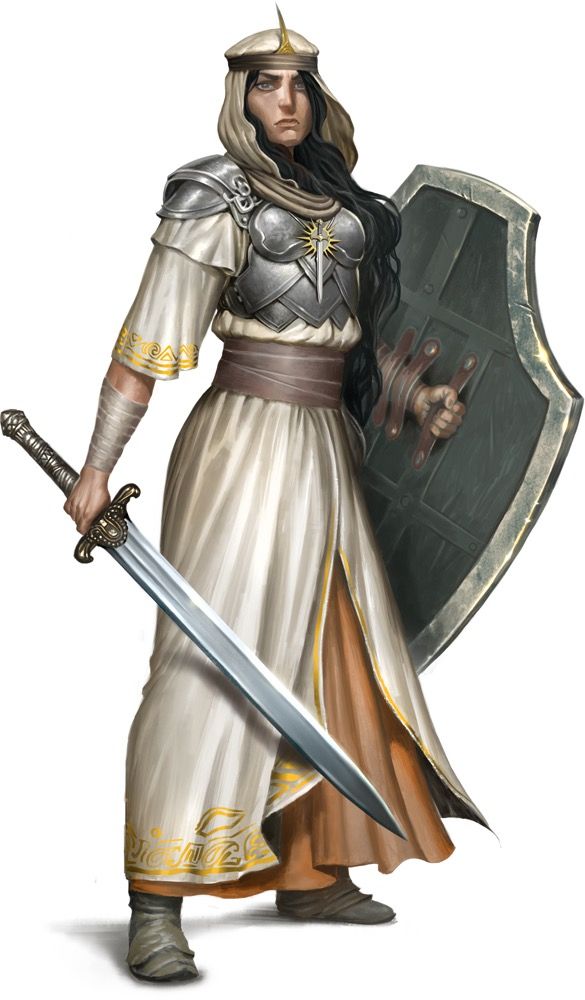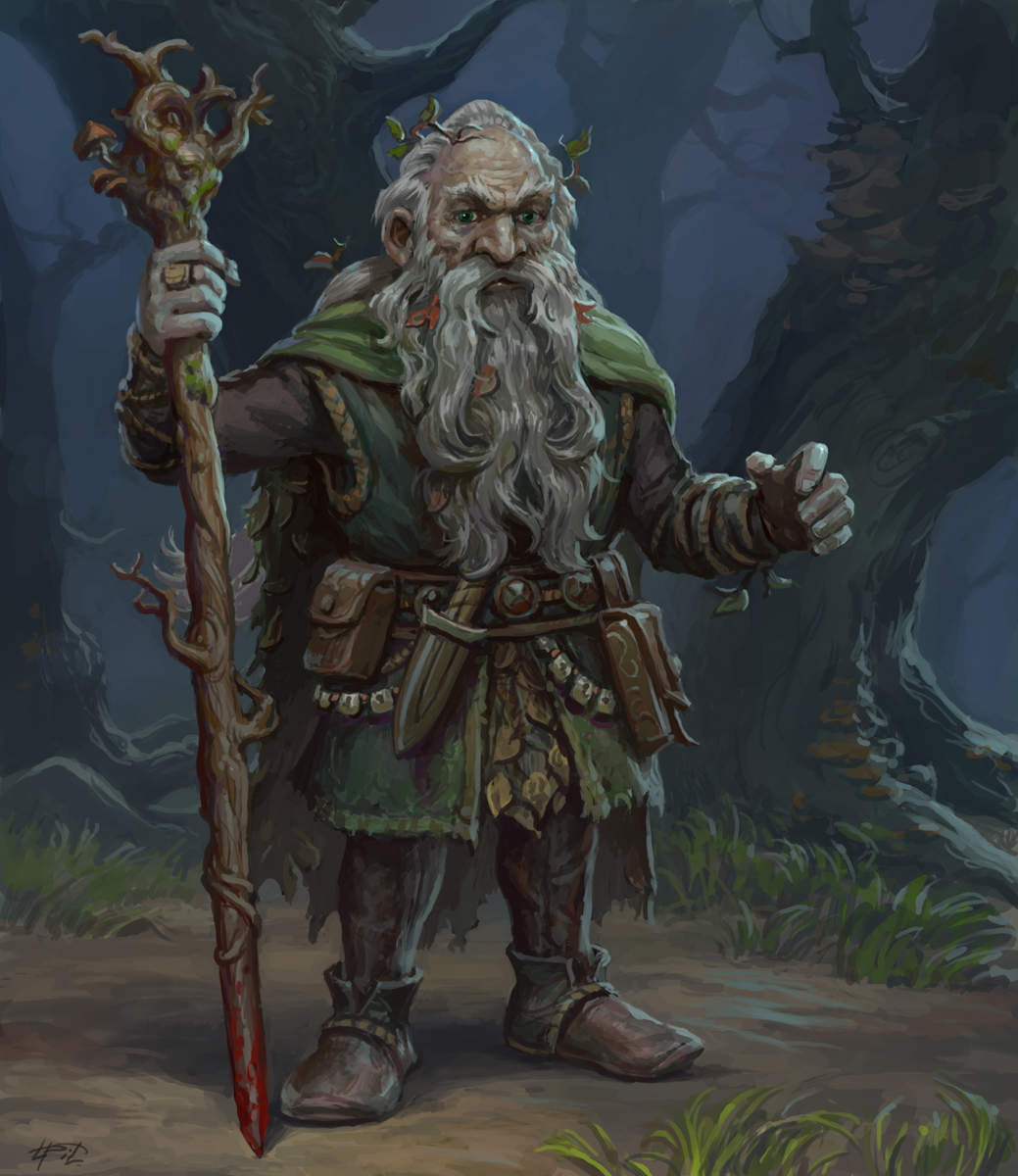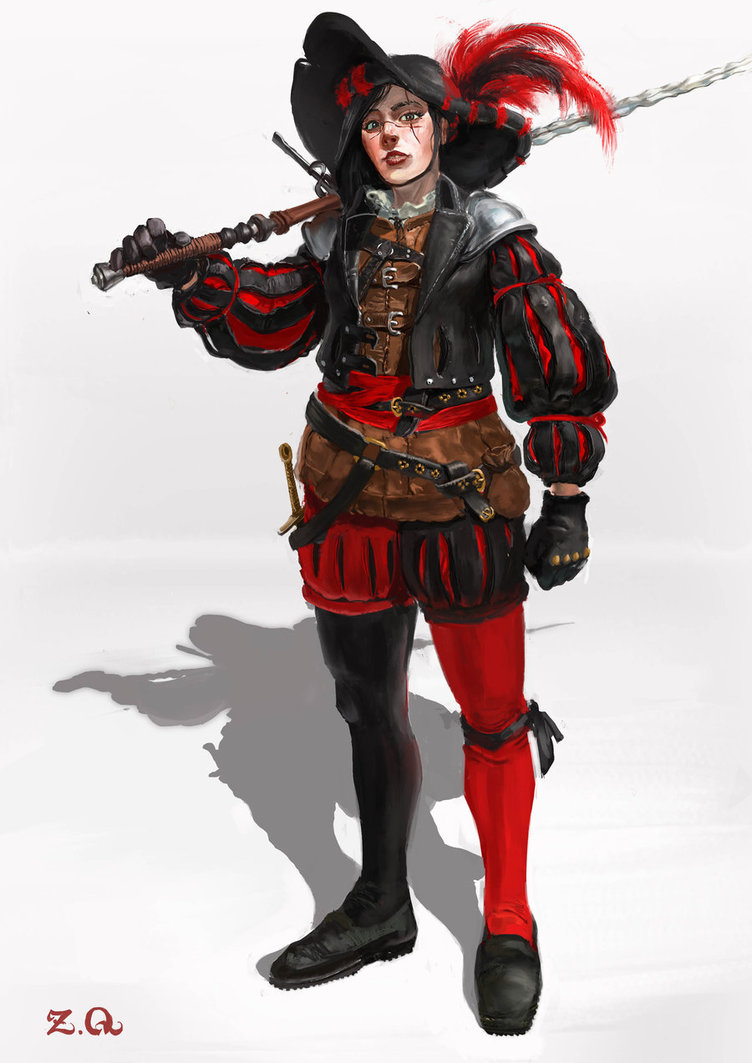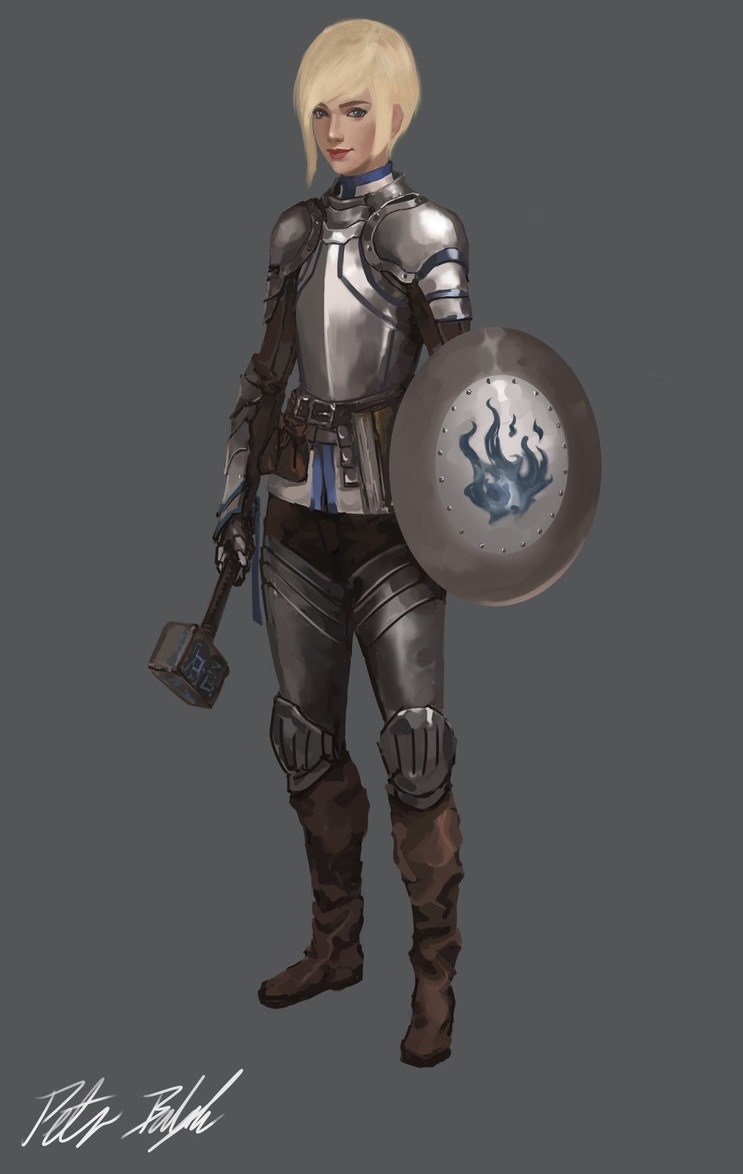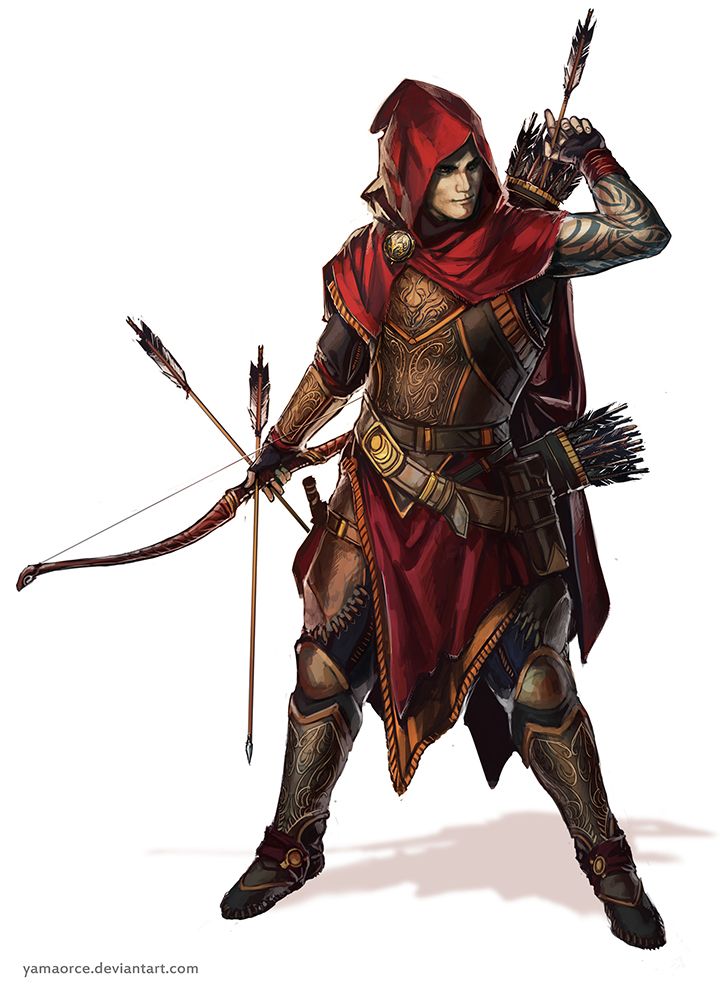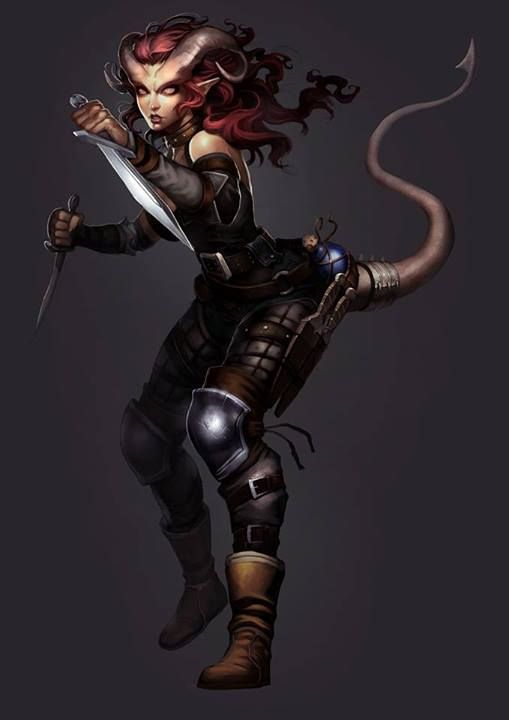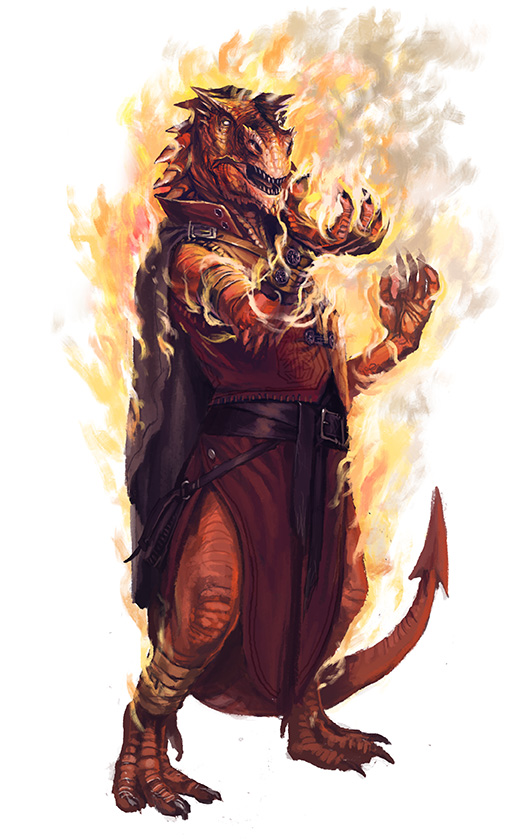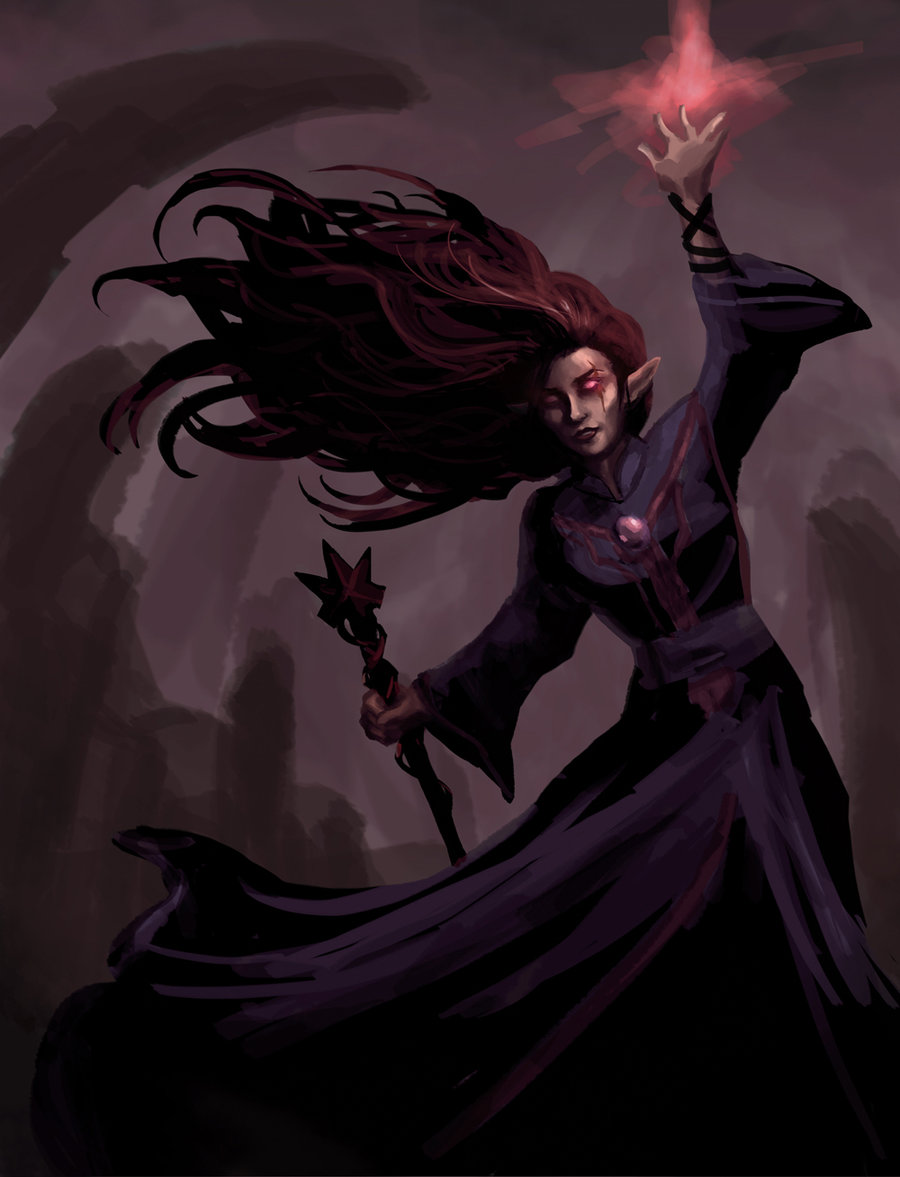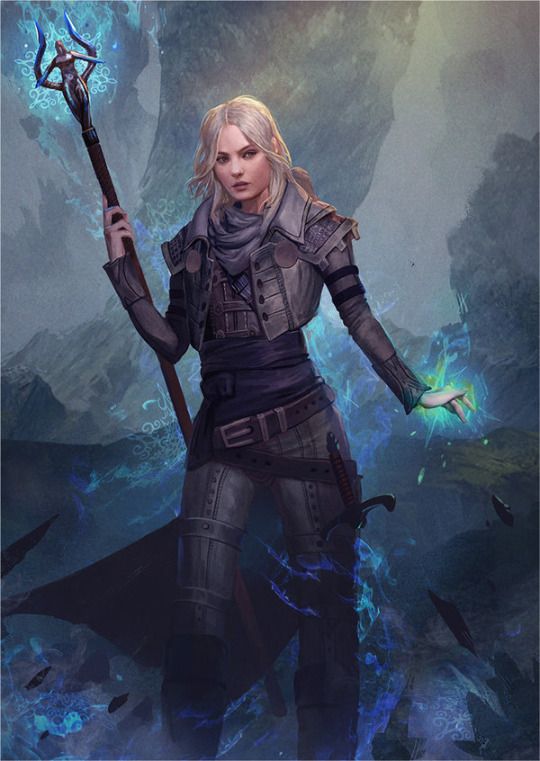Classes (Sfartalheim Supplement)
Disclaimer: These archetypes are to be used as guidelines while in character creation and more importantly, this is to inform the players about the simplistic stereotypes that the rest of societies believe in.
Barbarian[edit]
Out in the wilderness of the frozen Skanze forest have a tribe of Elves lived around the area for thousands of years. A disturbance brings the sleeping Skanzen Elf to high alert. She sees a group of Union knights trotting down a dirt path in this unknown wooded landscape. These knights don't even know the name of this place in their native tongue. When wondering about this place, one knight's mount is quickly decapitated followed by a screeching warcry. The other two draw their swords as fast as they could. The fall from his mount crushes his leg under the dead horse while the other two deal with the Snow Elf. She first dodges the swing from the knight to go under his armpit and stab him there. Under a relentless assault, the berzerker Elf charged in to disembowel the last knight as he panicked.
Incidents like this still exist in the dying age of the knight. Even in the changing time of progress within the Continent, there are still tribes of nomades and outlanders who scoff at the idea of civilization. They are unrestrained by the laws or culture to prevent doing whatever they like, as might makes right in the worldview of most barbarians. From the snowy Winterland of Skanze where only the strong survive, to the wooded stretches in Osterland with roaming tribes of Orcs. These places still see a few barbaric peoples still living almost unchanged as how they have lived for centuries. The Snow Elves in the north still resist the brutal order brought upon by the Skanzen Union from the southern Humans who have migrated north while simple lawlessness grips the east. All barbarians use either rage, bloodlust, pain, power, magic, or a combination of these traits to fuel themselves to accomplish their goals. These goals can be anything from combat, scavenging, to negotiation to have their own natural skill be heightened beyond expected levels.
Social Darwinist[edit]
They believe in the opposite of most civilizations throughout history, which is that luxuries and prosperity are a good thing. Not so much that the idea of the two is necessarily bad per say, more so the way it is obtained in the first place in most states were bad. For example, many who live in luxury due to the prosperity of the state will eventually weaken the society to the point that others who covet the wealth will bring the prosperous state's downfall by contesting for luxuries. The over-reliance on wealth for most people will lead to the collapse of said people if there were any shortages of the wealth. There are two options most tribes follow, the first is to have the weak and defenseless serve the strong for protection and having the privilege of being allowed to live within the tribe. The second more extreme approach is to have the weak be banished or killed to retain the overall strength of the tribe while getting rid of extra hungry mouths to feed. These tests to prove oneself the right to live is a constant theme in barbaric societies which have forced a class of strong people to exist as the nobility.
Strong Leaders[edit]
Where civilized folks see the barbarians as barely a step above animals, in most uncivilized societies, they are seen as a thing of admiration. In civilization, the village's strongest can't simply take food from other's homes just because he feels like it. Outside of civil societies, this is the norm and most envy the daring or strength of those who have stolen from them. These people are the leaders of whatever rank in society they come from as most in barbaric society don't have the skills to become the feared barbarians that nations see. Those with strength don't become a leader just from their own strengths alone, they must be able to prove themselves by daring to take command of a situation then keeping their command from usurpers. This most likely creates a culture of a constant test of strength for the ones becoming leaders. It also culls the ones unable to face any sort of danger at all times.
Bard[edit]
He has no choice now, it was do or die. First, the man took out his lute to retell the event he witnessed. The beats, notes, and words were all woven together in such a way that it would be indistinguishable from the truth. No matter what false story he sang of, the magic vibrated within the air to seep into the court's minds. Some resisted to speak out against this soft lie while most simply listened with enthrallment. Eventually, the so-called traitorous actions of the noble's daughter raised the father's ire. To the point where he had unknowingly stabbed her with his own ceremonial sword. Everybody was baffled by his actions and stared in horror as the bard escaped when people were coming out of their stupor.
Sounds in it of itself can be a powerful thing. Words are exponentially more powerful while songs are on an entirely different level. From the hummings of mundane life to the battle hymns of wars, music transcends borders and states. Among these things can tell a message of the crudest subjects to modern commentary or reciting ancient history. Much of cultures are defined then molded by a rhythm of the beats heard by all. Bards are those who understand the power of music from the lowest to the upper echelon of society. It does help when these notes hold with them magic to affect the physical world around them. For the modern understanding of bards, magic comes from the fact that when a person uses weak magic along with the right vibrations in the air to amplify its effect. This can be seen to when those who've mastered this skill being able to heal with the smallest amount of magic. The Elf, Human, Dwarf, and Gnome cultures know the power of bards better than most others. For the bards, music is more than just a series of rhythmic vibrations bouncing around in the air.
Magical Sounds[edit]
Bards are by no mean the sole masters of using sounds with magic. Often then not, they are seen as useless by most adventurers who would rather have more direct and violent means of resolving problems. Although these musicians do have their uses beyond just harming foes, they are not held in high regard by the rest of most societies. The lack of awe-inspiring powers and destructive potential normally accompanied with magic makes people view bards in a different light. What bards do is essentially throw small amounts of magic into the air then use vibrations to enhance the magic's power. Such a way of magical use is seen to be a dastardly approach as even if a wizard is feared or mistrusted most, at least the wizard has the decency to actually fight his foes. The bard, on the other hand, can cause fear and panic instilled into their foes by artificial means. Not to mention the ability to coerce others to things like unintentional kin slaying or suicide.
They are an archetype with no real means of defense from their skill, and no real means of offense. For the dependence on their magic only allow them to enhance their natural use of weapons or confuse foes. As inspiring and manipulative a bard can be, it would count for nothing if they can't have a means of physically defending themselves in a fight. Often in a fight, bards hide behind those magical or physically stronger to avoid harm at all cost.
Adaptible[edit]
Simply being able to play music in it of itself doesn't make a persona into a bard. Entertainers, minstrels, and musicians all lack the one thing that allows them to become a bard. It is with magic that the notes they make can warp reality for those around them. Unless naturally gifted with magic, most never pursue a life of learning the arcane knowledge. Their ability to create illusions and control minds have also led to many nobles banning them from coming anywhere near their courts, under the pain of death. Armed with the knowledge to do many different things using magic disguised as regular musicians, they don't specialize in any particular field. Building off of their experiences can also allow them to have a better understanding of how strong their magic is.
Accompanying heroes, champions, and legends in their adventures also let bards be able to rewrite history. As compared to being told an accurate account of those who were there, the memorable retelling with music and altered facts would become much more popular. This gives the bards a dangerous ability to influence the public by rewriting history with outright lies then claim they were at the scene. Commoners give bards an undeserved authority when bards say things as facts. There is also the problem that magic can be used to slowly change the audience's opinion on a matter without anybody realizing the truth.
Cleric[edit]
With holy light and another sort of magic flowing through her, she began to face the heretics before her. There was a might of a god when using the curses before attacking the unholy hoard. One after another fell those who would defy the woman. In the carnage of the dead and dying that surrounded her, she praised the name of the god of light and all that is good in the world. Still, more heretics attacked her and refuse to convert. Bringing joy as she heals the other champions near before jumping back to the fighting at hand. Those that resisted the will of her god was probably unknowing agents of the god of darkness and all things evil in the world. In the visions she saw must surely be right and that victory was at hand no matter what the odds that stand before would say otherwise.
Although rarer than the past, clerics still exist and wonder the lands of the Continent to perform the will of their respective gods. The religious wars flaring up all over recently have given a sudden surge of clerics leaving their homes for holy service. More militant compared to the clerics of a peaceful past, they none the less, have more of an impact in their surroundings as these clerics ignore borders or laws if it means it would hinder their god's will. Often enough, they are rather useful in a host that stumbles upon daemonic monsters or unnatural abominations. Under normal circumstances, clerics would be seen as suspicious for their use of magic. For them, however, it isn't a normal situation when they must use all tools at their disposal to fulfill their divine task, everything else is secondary. Even the commoners know this when talking to a cleric, they can understand that they won't suddenly explode from magic welling up inside, or become power-hungry from the arcane knowledge. Well, at least most of the time they won't anyway, and the ones that do end up being that were erased from history by the Pentarchy.
Holy Instrument[edit]
Through their bodies do the gods act out upon the mortal realms without a need of magical surges. Different than the regular priest found in temples, they must act to take matters into their own hands. This can also cause friction between the religious hierarchy and the clerics who would go against the order if it means following a divine agenda. Clerics are by their nature always on a task to obey the will of their god by what means are there for use, unless they finished their quest and become something else later in life. Unlike the wizard, sorcerer, or druid, the magic clerics use are offered by the gods than if one learns of it within the mortal world. Clerics more or less act as funnels to let the gods channel their powers into a mortal temporarily. This is useful when facing equally magical creatures who have magic running through their veins, to preventing a warrior to fall in combat from something that should have crushed their rib cage. They are seen as a good compromise between a healer, warrior, and mage to provide a well rounded offensive or defensive support archetype that the rest of the group will see as useful.
Godly Vision[edit]
Their call to adventure, or in their case a crusade or jihad, is often a sign of the divine for their participation in an event of some sort. Not necessarily about a war to follow divine will, the ones that get famous are often about a conflict than through peaceful actions. These things can be anything from the way a bird falls out of the air dying or a horribly vivid nightmare. The gods are not particularly clear in these matters for the mortals to act upon. Learning to harness magic, those that answer the call are willing to use whatever they can get their hands on to achieve their goal. Most clerics are fanatics to some degree when it comes to anything related to religion, leading to them not just agreeing with commoners to be distrustful of mages, but also personally led peasant mobs to burn suspected mages. Some justify traveling with mages by stating that they are the best option when it comes to putting down rogue mages and that it is better to have a potential enemy closer than the friend. This has become a real problem for governments who want to maintain peace within their realm as these clerics have been increasing in numbers as of late with the religious turmoil.
Druid[edit]
Taking the form of a bear, the Dwarf was ready to drive away the loggers who encroached on his mountain. He first gave a loud growl to frighten the workers cutting down the trees before leaping out of the darkness. Mauling the Human then a Dwarf nearest to him was the easy part. Soon enough, these workers ran for their weapons as they were prepared for an encounter. The Half-Orc tried to hack the bear to bits while an Elven worker used his spear to try gutting him. With great hast, the bear fell back deeper into the trees as the other two chased after him. Turning back to his normal Dwarven form, he called upon lightning from the heavens to strike down the Elf and cause the Half-Orc to flee. With only one survivor, it would be a good warning to spread throughout the realm. The Dwarf then goes out of his way to smashing all the logging equipment in his sight using boulders around him in a landslide. These awe-inspiring displays of power were only seen by the sole logger fleeing the mountain.
Living out in the wilderness, druids like him exist as the forces of civilization keep trying to conquer nature. Although, they are more commonly seen living with barbaric tribes rather than just by their lonesome. Hermit druids are also not rare either when compared to the other kinds. Similar to clerics, they too believe that they are an extension of a will from a higher power. Unlike clerics, this higher power is not necessarily divine or for that matter have anything to do with religion. To druids, it is nature herself that compels them to action, this can be interpreted in any way, including a god pestering them to go on a crusade too. They are enemies of civilization in all its forms, but they are willing to ally with it if it means the short-term benefit of their respective sacred environment.
Elemental Magic[edit]
For the druid, nature or the gods of nature are held as in the highest regard, even more so than any other god or material possessions. Some going so far so to kill friends in a heartbeat if it means their pristine nature is preserved. Most try to attain enlightenment to transcend beyond the mortal understanding of the universe by whatever means they see fit. Some simply serve their local nature spirit or god to protect their realm. These practices make the druids have in common with Shamanism or the ancient Alfen Pantheon. Although out of the limelight compared to the more popular Pentarchy or Elash religions that came after, there are still people that worship the old gods to preserve traditions. Druids being one of the few followers of the ancient religion, they have access to the five elements of magic, fire, water, air, earth, and wood. In contrast to the other types of mages that use more abstract concepts to fuel their casting, they have a very physical presence in their surroundings. Commoners also believe that druids might be responsible for the natural catastrophes after angering a lone stranger in the woods. This idea isn't entirely unfounded when druids do kill a villager's worth of people for accidentally trespassing their territory.
Ancient Code[edit]
They follow the worldview that all elements must be in balance to achieve harmony. Of course, a harmonious state has never existed in the mortal world for some time now, but they still strive for this unattainable goal. This perfect existence was told to have been the norm within the mortal realms some thousands of years ago. They also work against other mages that tamper the very fabric of reality itself as any work in that nature is inherently against balance. Even if the work was done to try to achieve harmony, the means to this end is an abomination that almost all druids wish to see destroyed. They also might very well kill other druids that try to promote one element being superior to all others, no matter the circumstance. For divergence is a step shy of heresy. There is also a particular burning hatred in all druids against anything they deem unnatural, including undead creatures and certain siege engines.
Fighter[edit]
The woman's regiment was sent in first to deal with the schiltron that the knights couldn't charge into. Peasant spear levy tried their best to hold off the Imperial troops that were cutting through the spiky formation. Some levy fled at the first sign of losing while others slipped and slide from the blood-soaked soil. When the enemy finally broke to flee in fear, the Knights came in to trample or gut them, exponentially inflicting losses. Yet the battle wasn't over for her, there was still that lord-general for her to kill, beckoning them forward, the other heroes followed the fighter. Soon, they stumbled upon a messenger, which the woman quickly killed his horse to prevent his escape. This allowed the party to slaughter their way through fearful peasants to reach their target. Once they confronted the target, the sorcerer shot flames to try to melt him to no avail. His armor was covered with magical properties that negated most magical attacks. Then the ranger shot arrows to connect with the target's shields instead of his flesh. Enraged, he lunged to pummel the gnome ranger into a jelly. The lord-general was halted when the fighter brought her weapon to cut off his right arm below the elbow. Reeling back in pain, she took that opportunity to wheel around to his right side then decapitate him.
Fighters have been a part of the world history since the idea of using clubs and sticks to kill each other was invented. They have the most diverse backgrounds out of all the archetypes as anybody from the lowest slave to highest emperor can become a fighter with the right training. Most Commoners also see them as the most normal of all the archetypes, in that just about anybody can be a fighter unless they are physically prevented from doing so. The mastery of arms is something, everybody can obtain without being magically gifted or other such nonsense. For all fighters are at their core are masters of using arms and armor as extensions of their body. When one is able to perfectly achieve synchronization with inanimate objects, they become more powerful than any mage. Although some have come close, none have ever become the ultimate warrior yet.
Warrior Nobility[edit]
Those born into a class of warriors assigned to fight for their liege have been trained to kill from the time they could walk. They are to become masters of as many combat techniques as they can learn before being sent off into battle. Their privileges in most societies were created to please a class of heavily armed and dangerous warriors from simply overthrowing the local government. Thus they hold the lowest rank of nobility with the possibility to ascend, unlike peasants. That is also why these warriors are also expected to be able to use any weapon given to them. Understanding of advanced martial arts moves is also taught to these fighters at a young age to help them become better with arms. At first, the warrior nobles were expected to fight on chariots. The rise of larger horses and cheapness of mounted levies saw to it the decline of expensive chariots. Then, they were expected to fight on foot when it was considered more honorable to fight along the front with their levy. Now, these similar classes of warriors were expected to fight on horseback to show off their wealth when most peasants couldn't keep a war horse.
Professional Mercenary[edit]
Most of the time, there is a clear difference between a knight and a mercenary. One is naive enough to believe that they will always be on their master's side in a war. The other knows how to make money quickly without being attached to any one side. Being a fighter doesn't mean coming from the peasant levy, town militia, or even the royal army. It means that a warrior is such an expert with their weapons and armor that they are on a whole another level when compared to the inexperienced soldier. Veterans, officers, and elite troops can fall within this archetype if they have sufficient experience and skills to fulfill the role. Those that wish to make a lot of money are willing to be commissioned as soldiers for hire to the highest bidder if they know how much better they are to the average levy. This has also earned full-time soldiers the stereotype that they are willing to defect as soon as the enemy bribes them off. That is only true for the Sudergothic merchenaria while the Hochisch guard is almost fanatically loyal, going so far as to still fight even when those that hired the guard were dead.
Monk[edit]

|
|---|
| Not one to show off any sort of wealth, monks are willing to wear things others would scoff at. Concept art of Georgios Kostas from Assassin's Creed: Revelations |
Breathing in to channel the magic in the air, he had to calm his mind before approaching these bandits. The meditation of focusing on an apple in his hand whilst sitting down on the grass helped him clear his head of all distractions. Suddenly, there it was in the feet and hands of this monk. One powerful surge of energy that was undoubtedly Chi flowing through the body. This caused the man to jump to his feet and went hurling down the road while his friends ran up to follow him. Crossbows fired to have the bolts be knocked out of the air from the pinpoint accurate and unusually strong man in ragged clothing. When the monk closed in with the first outlaw, he kicked her so hard that she was sent flying back then vomited her launch out. The second bandit tried to fire his weapon at point-blank range, only to have his hands burnt crispy with flames coming out of his attacker. The last one took out his hatchet to swing and miss his target. When the counter-attack came, the man held up his opponent’s left leg in the air before punching it in the kneecap to shatter it. After winning the fight, the monk was happy that nobody died to break his pacifist code.
Monks that use Chi for combat, are not too different from one another. They can have a basic understanding of the powers that other monks use. The magic that naturally exists in the air around them is harnessed via advance breathing techniques, which take at least several weeks for a protege to start using properly. For most people starting out, it would begin with a month or two of beginner lessons. Unlike the bard, monks don't expel magic into the air, they absorb the magic from the air into their body to then be used as conduits. The knowledge to use Chi as weapon or armor for monks were first brought over from the far east during the Orcish, Human, and Centaur invasions into the Continent at the Fall of Alfenheim. With the inability of local monks to forge weapons or armor, the Continental holy men quickly adopted the alien Chi teachings as a means of defense. This was rather useful during the spread of the Pentarchy when these monks could actually defend themselves from bandits.
Chi Power[edit]
Using Chi for monks is that of the strictest branch of any magic-wielding archetypes. Their study of this magical energy force is so precise and slow for the deliberate attempt to prevent any accidents. Concerns of power-hungry people learning of it is also another reason why so few monks know how to use Chi. Some believe that this Chi transcends realities to allow others in different universes to be able to use something similar as well. The actual power that this magic allows people to do extraordinary things is all drawn from breath. The idea being that because the magic is allowed to flow throughout the body using the veins, a monk is able to direct it to center on a certain body part. That also lets them be able to expel the Chi out of the body in the form of things like flames. Unlike mages, they can’t exactly explode into a tornado if they have too much energy.
Warrior Monks[edit]
The idea of monks using Chi as a weapon came about when holy men from the Southern Coastline started trying to spread the religion of the Pentarchy, going north and deeper into the Continent. Bandits mostly confuse the difference between the local priest and a traveling monk when robbing them. These criminal have painfully been reminded the difference between the two when monks could beat their faces in unarmed. Although the monks that do know how to use Chi are few in number, that is why only the ones who can use Chi are allowed to be sent off to far away lands. Most monks that live in isolated monasteries are often just drunks that record local literature to be archived or copied. There are some monasteries that ignore isolation by actively involving themselves in local politics. This has posed a problem to a few nobles who wish to have complete control over their domain when a group of dangerous holy men violently oppose them. Some have gone as far as to build their monastery as a fortress. Monks are the second most tolerated of all magic-wielding archetypes as they have the devotion of clerics while using only the same amount of magic as bards.
Paladin[edit]
Shinning in the light of the full moon, the armor on her gleam with that of holy righteousness itself. About a dozen or so Orcs charged the adventurers to a head-on engagement. Using magic to heal a Gnome that lived in this village, the girl quickly turned back around to raise her shield just in time. Blinding lights emitted from the hammer caused the Orcs to stumble back in shock. The Orc who was right up next to her shield had his head bashed in within a second he was blinded. Villagers looked on in amazement and horror at how she was able to fend off two or three Orcs at the same time. Healing the wounded when she can and killing the wicked when she can't. The battle became more frantic with all the local fleeing as she pulled them to the side saving them from the fighting while driving the enemy back. It all seemed like insurmountable odds for most of the time. Their defenses held until the surviving Orcs broke and ran.
All paladins by their nature can't be selfish. That is the one thing that is true of every single paladin to ever exist. Unlike the cleric, a paladin must gain the attention of the divine by swearing an oath of allegiance with all things good in the world. That very much depends on which god they swore to and how they try to gain their magical powers. Some of the most common oaths are to pray 7 times a day, never start a fight, never cross a body of still water, never touch polish metal, never actively harm plants, or only have a vegetarian diet. They are stereotyped to have the hammer to smite evil, carry a lantern to light the way through this dark world, and use a shield to defend the defenseless. This would mean practically no paladin comes from barbaric societies that value a might makes right mentality. Commoners think of the paladin has an intimidating figure who towers above all others with their sheer presence and unwavering sense of justice.
Order[edit]
Paladins are all sworn to fight for all that is good, right, and just in the world. At least on what their patron deity would see it as those values. Some don't even follow anything divine but swore an oath none the less, this has given them the attention of the gods along with it the magic that comes with the attention. For it is their own steadfast position on justice that makes them an intimidating figure compared to the other archetypes. They know that the one who adapts to the world has a weak moral code, while the one who changes the world to fit them has a strong moral code. All paladin ends up in some sort of category with the latter. With this sort of mindset is the reason why they keep fighting evil to impose their version of order onto this changing world. For as long as champions of evil exist to enforce their rule over the world, there will also be champions of good that will oppose them. The paladin is simply the purest form one can take to join in this fight. Although governments have thought them to be useful in the past, the paladins have become annoying what with their investigations into corrupt officials and the like.
Eternal War[edit]
There reasoning to become a paladin might be due to the horrors they witnessed to just in spite of the unjust world around them, there are many different motives that might grant one to become such an archetype. When a person does become a paladin, they are participating in the eternal conflict between the light selfless forces of good and the dark selfish forces of evil which have existed since intelligent life began. This war transcends universes to have all conscious lifeforms be affected by it in different timelines no matter what they do. To be a paladin and have a normal life is a contradiction, their relentless chase to achieve peace in the world makes a consistent lifestyle all but impossible. One day they may be helping out a village with a bad harvest, another day be stuck fending off a hoard of monsters. True paladins are such a rare breed that they are even rarer than a mage, this dedication to follow their own moral code and oath is unheard of for almost everybody in the Continent. The recklessness to have the mind of somebody who would jump into danger to protect others or take the blame for an injustice is very uncommon indeed. To live like this is to put themselves and others close to them in danger at times, even long after they put down the shield.
Ranger[edit]
Waiting in the leaves of the tree, the three Dragonborn officers searched along the road to find tracks of a person who recently passed by here. The one in the lead turned around to discuss his findings with the other two, halting the group. The man in the trees shot a single arrow to dig into the neck of the leading officer. Before that Dragonborn could even fall dead onto the ground, the one to his right teleported away while the other officer shot lighting in his direction. When he did jump down from the branch, there was an officer waiting for him with fire coming out of his mouth. Sliding under his attack, the man takes out his mace then bash the officer's legs. While the Dragonborn was angerly spitting out curses, the ranger brought down his weapon for a fatal blow. The last officer prepared to flee the scene but a whistle caught her attention. Then came a falcon out of nowhere to claw out her face as the ranger shot arrows into her back three times.
Hardened by a life of roaming in the wilderness, the ranger is a reminder that anybody has the chance to adapt far from the comforts of civilization. From amidst the mountains of Hochpine to the swamps of the Diniper, there are people who survive feeding themselves using a bow. These skilled archers somehow ended up living by themselves for a time and had to master survivalist traits doing so. Without others to help them, a ranger becomes a self-reliant individual who forgets the aid others can offer. This can cause them to become loners or worst, be socially awkward. When a group is crossing the wilds of the Continent, planned to assassinate a target, or track somebody down, a ranger can prove themselves to be useful as a member of the group. This tendency to live far from any sign of urban centers have caused the commoners not to have hostile views of the archetype per say, more so that a ranger is quirky and strange without the malice of mages. The governments of the different realms often view rangers as not really a threat to their rule but an annoyance nonetheless.
Survivalist[edit]
Even as more and more of the Continent is mapped with each passing day, there are still huge swaths of land left largely untouched. Anybody wishing to survive navigating through just places either needs to be a local or have the skills to not starve to death. The need to track, trap, and kill game is necessary to ensure one's body didn't degenerate so that leaving these natural deathtraps isn't impossible. It isn't also rare to have rangers as guides for the more dangerous places of the world if one was rich enough. Time spent living in the wilds can make even the most pampered city noble into one who needs readjusting into urban life. Such a change is drastic but isn't too unfamiliar for druids that can understand their lifestyle. In fact, the magic that both rangers and druids use are similar enough, although the difference is that rangers lack the elemental part. The hard life of a ranger means most don't even care about protecting civilization or other such noble nonsense, for some, the joys of hunting down sub-races is all that matter.
Self-Reliant[edit]
The ranger might hunt, track, or guide others, but their ultimate job is to kill monsters. In a way, they are indirectly helping the civilized realms remain safe from wild threats. Goblins, Orc tribes, and Centaurs are a very real danger when living on the frontier for most people. Orders of rangers and alliances with druids do exist but generally, rangers often work alone. That is not to say that they don't join forces with other people, however, they prefer to be alone if they can. Harsh environments have forged the rangers in a way that they don't see the other archetypes, except druids and barbarians, as nothing more than coddled castle-dwellers. There is still usefulness in working with coddled folk as well, like charming their way into a palace as servants. The chance that a ranger just suddenly leaves because they think the others in a group are too inept still exist as well.
Rogue[edit]
In the dead of night, a Tiefling stalks the guards to check their patrol rotation. The pitch black darkness masks her presence from the ones without torches. When one guard left the street to go around the corner while the other guard standing by the wall decided to change the torch, she made her move. Landing gently on the street, the rogue snuck along the wall as the guard had her back turned. Once at the right position, the Tiefling climbed up the old thing which had all sorts of creaks and bricks sticking out. After she made it over the barrier, the rogue was careful to stay in the dark while making her way to the medallion inside a bedroom. The place was practically easy pickings when the window was left unlocked. Wishing to make a quick exit, she jumped onto scaffoldings near some building before leaping onto those structures away from the fortress. Thankfully, she was so fast and quiet that nobody noticed.
There are those that will do anything that they have to in an urban environment just to survive. These people can be anything from the ones running the rumor mill to a beggar on the street or a thug working for a criminal family. Taking up on jobs that are considered unacceptable by the rest of society, any of the people mentioned are to some degree, a rogue. For most people, the real difference between a swindling con-artist and a rogue is that the rouge is on an adventure. This archetype may have a specialization in stealth, assassination, magic, or deception, but it matters not when any of these skills can be used for one's benefits. That can be anything from just not starving to death to getting out of house arrest or helping the poor. Such is a rogue's life when everything they do will somehow directly or indirectly help in some way. Commoners think of a rogue to be only slightly more trustworthy than mages in most realms. Those ruling over the cities have tried to stomp out rogues from living under them to no avail, and so have prompted to simply let them exist to a manageable size.
Deadly Cunning[edit]
One might need to understand Chi for a small amount to understand how rogues can operate. There is the idea for monks taught during their combat training about being able to strike down their opponents without giving all their energy to a single blow. Later expanding on this is that by giving several lighter well-placed hits can bring down even the biggest targets. Rogues took this idea to the extreme what with their versatility for anything that they have at hand. It didn't matter if it was people, tools, or the environment itself, just about all things can be used to even the playing field for them. The best armor for a rogue is to not get hit at all, that is why many have opted to simply not get detected in the first place. Others have chosen to learn Close Quarter Combat, which is a system of combined combat techniques that let's one switch between melee and ranged weapons. There is also those that use ranged weapons instead to put as much distance between their foes and them as much as possible.
Criminal Scum[edit]
Turned to a life of crime with a lack of food, helping the poor, or for selfish gains, most people believe a rogue to be natural outlaws. That isn't true per say, especially considering a noble and investigator can end up as one if they keep fooling around in the slums. Although criminal families do tend to hire rogues as extra help for the more difficult jobs. Most are willing to use underhanded tactics, break laws or cheat to accomplish their goals. That and honor doesn't count for much if one ends up starving on the streets. This can become a real problem when a rogue is dealing with a law-abiding paladin on their adventure. Their desire to leave normal lives, as much as they had one in the first place, can be something from as simple as greed to saving the ones they love or saving the place they lived in. The rogue isn't a bad person but more so that they will do anything to survive.
Sorcerer[edit]
Bursting into flames in the middle of the marketplace, the Dragonborn was confused with the whole ordeal. This was the first time his powers manifested ever in his life and all others around him were bowing. The sure sign of nobility was consuming him for everybody to see. Flexing his magical muscles, he shot out a pillar of fire straight into the air as a display of his power. Those around him were awed by it and was reminded by the sorcerers ruled over them. The peasants were surely gullible enough to think he was chosen by heaven or have distinguished bloodlines to have such an ability. For to be able to wield such might without training must be a blessing to show their domination over them. For to be able to wield such might without training must be a blessing to show their superiority. Back on the other side of the Continent, somebody accidentally fried a baker while she was buying bread. Soon, an angry mob surrounded her to have her dragged off to a tree. As much as she called upon her powers to act again but they were for naught. It only took a few minutes for the girl to end up hanging from a tree.
Take it as a blessing or a curse, nobody picks to be a sorcerer. By magical bloodlines or picked by the cosmic forces to have these powers, a person is always given these magical abilities rather than training to use it. That is the main difference between a sorcerer to any other type of mages. Sorcerers never need to study years of arcane knowledge or make daemonic contracts to cast their spells. The magical energies flow naturally through their veins as much as blood does. That can make them useful as a walking time bomb for an adventuring group, with the benefit of the sorcerer knowing when to explode. Although mages are generally either mistrusted to outright killed on sight, sorcerers earn their place as anything from the noblest of magi blood to being seen as horrible mutants, it really depends on which realm a sorcerer enters. But to most non-magi nobles, they are seen as the second most dangerous of all mage types.
Magical Bloodlines[edit]
The most common way to end up as a sorcerer is to have these powers from birth then learning to control them over time. There are those that do have the magical energies when they were born but it never manifests until they are older. This idea of magical bloodlines is understood to be that a sorcerer's ancestor once breeds with a very powerful magical being to have offsprings. Dragons are the most likely to be the ancestor of a sorcerer but other beings like gods or spirits will do as well. Although rarer, it could be the case that a sorcerer became a sorcerer in the first place via magical mutation. Anything from drinking enchanted fountain water to being cursed by fairies or wandering through a mysterious swamp, absorbing magical properties without killing you can make one end up with arcane abilities. This method of attaining powers is also not only hard to find but is also deadlier as well, as even if it doesn't kill them outright, they can still be inflicted with an illness for life. The illness can be anything from a minor inconvenience to slowly killing in agonizing manners. It isn't also unknown for mutant sorcerers to have kids that could inherit their powers as well.
Pure Power[edit]
Unless they enjoy being under the constant eyes of paranoid locals, sorcerers tend to gravitate to a life somehow involving adventures. This can be as simple as helping out those that pass by their home or take up a job by traveling from village to village, with little time to stay at home. The thing that one has to understand is that unless a sorcerer expells their energies on a regular basis, there is a risk of them overflowing with magic in odd ways. Adventuring could be used as a healthy and constructive way of exercising their powers in predictable manners without needing to fear suicide or upsetting the neighbors. Within places like a magocracies, sorcerers can be seen as those of noble magical inheritance that have a duty to rule over others with their birthright. In other places, however, they can be killed on sight for posing as a wild threat to the vast majority of the non-magi population. There are also different laws in place which restrict a sorcerer's use of magic depending on the realm they are in. But for all of them, the idea of versatile magic still applies to them being able to change styles on a whim.
Warlock[edit]
The Half-Elf fumbles about her pouch to get the ingredients ready for the summoning ritual. This odd voice in her mind won't stop pestering her unless this is to be done. All things considered, whatever this voice was, it had good intentions if it means to give her magical powers to save her city. Things were quickly arranged in an arcane circle to call forth a daemon, but she didn't know it was a daemon in the first place. Signing the contract in blood, the shadowy entity in her sight exchanged a forearm shake as a gesture of goodwill before imbuing her with power. The warlock was quick to act by blasting the side of a mountain bringing boulders and mud to block the only direct road to her city. When assisting the locals to evacuate the city, she had a bad feeling in the back of her mind about a shifty looking character. The Half-Elf would go on to break his legs to make sure whatever evil thing he was up to die along with the city's defenders.
What does one that calls those that cheat their way into obtaining magical powers without years of training or enchanted blood? That would be a warlock, the most hated and feared of all mages within all of the realms. Their contracts and pacts with daemonic entities from beyond the physical plane of existent are bad enough, what is worst is that they think they can be good with it. The idea isn't that warlocks can't be good, more so the idea is that they can stay good. All of them end up either retaining their good nature via suicide or end up as villains if they keep using their powers for a long time. There is also the problem that warlocks are known for their crankiness with their lack of sleep. Commoners outright fear and hate these mages just for their clear cooperation with daemons, seeing them as inherently evil. Nobles and adventurers, although hesitant at first, will end up using warlocks if they are desperate enough.
Daemonic Pacts[edit]
It is unknown why daemonic entities imbued certain people with magical powers in the first place, this could be through the signing of pacts or manipulation of noble individuals. The thing about daemons is that they could be seen and to act like benevolent deities for the locals that worship them. Daemons might also try to keep save others for their own unknown plan but warlocks know the daemons admit to their own self-interest, unlike other so-called gods. They are an unpredictable lot, a daemon could simply wish for a war to perpetuate while saving serfs, or seek awakening an ancient being at all cost. One thing is for sure, daemons don't have the best of intentions for others like true paladins. Wizards of all the other mages especially hate the warlock with a burning passion, for not only did they gain power without years of study, yet they got them from clearly vile means. But to most warlocks, it isn't until its too late that they discover their source of their new found power. They are often the wrong person to save the day but they arrived right on time.
Forbidden Knowlage[edit]
Maybe from the will of the warlock or the daemon, the warlock's thirst for knowledge is insatiable. Even wizards know a time and a place for not pursuing banned studies, no matter how much they protest at first. There is something different about warlocks though, it might be one finding a way to invalidate a pact or being influenced to find a specific tome. Others, end up unhinged from knowing a daemon is always over their shoulder and can end up claiming to understand the universe beyond comprehension. Whatever the case may be, they are the only mages that always end up at least almost obsessing over something, if not just insane about it. They are the ones willing to end up experimenting on themselves if there are no test subjects. If not for warlocks, much of history but mundane and magi would've never been found. Almost all the time have they been forced into a life of adventuring because of running from those angry of them, or by the demands of their daemon master.
Wizard[edit]
Looking through countless books in the library, the wizard was busy trying to think up for a way to help her party. This has allowed her to refresh on some old spells that she almost forgotten as well until she found what she was looking for. In the dark Imperial wood had these bandits move through when a thick mist came out of nowhere to blind them all. The wizard was also quick to use a spell to try to dull their other senses too in the confusion. blatantly had allowed the others in the party to rush in to try to capture these criminal scum without harm while the last one runs away. Using whatever components she had a hand, she conjured up ice to slow in him. Freezing the bandit's feet in place, he fell face-first into the mud. Somehow, they managed to take in all of their bounties alive.
Wizards are the most common and the first thing many think of when saying mage. They are those that study up to decades of their life studying a particular field of arcane power. Anybody can end up as a wizard if they are willing enough to endure years of training that other mage archetypes avoid altogether. Being able to be versatile with their specialization in just about every field, for all things arcane they are adaptable. Commoners might not have a hostile view of them like they would have of warlocks but they certainly won't trust such a tricky archetype. The ruling elites and adventurers are much more tolerant of them, for as long as they aren't blatantly selfish and evil, they can be rather useful in most situations. Their ability to have such variety spells at hand makes them be rather welcomed into adventuring hosts. There is also the case of wizards simply being bored of studying from book and would rather see spells' effect on living things firsthand.
Magical Studies[edit]
Generally being the most useful in society, most are seen in a more positive light than any other mage archetype. They can have various roles as advisors, teachers, soldiers, engineers, to so much more if a realm allows them that is. Others have gone mad with power once understanding how magic works, believing themselves to be gods with the endless possibilities. Although it might seem easy to utter a few words, do a few hand signs and sprinkle ingredients into the air, the reality is much more complex. Wizards have to undergo years of full grasping then practicing how to create proportionally right, geometric shaped, perfectly timed spells without blowing themselves up. There is a reason why the wizarding schools have high drop-out rates when considering how dangerous a botched spell can be. That is also why many people tend to back away and stay quiet as they watch when a wizard perform a spell. Some have even resorted to learning spells from ancient writings and daemons, although these spells haven't exactly been tested for safety.
Arcane Greed[edit]
Sure a wizard might end up with a mundane job tangling paperwork as their day job but it tends to be more exciting than that. They can end up working for a noble's court as the court magi or serve as a mercenary in an army. Others use the path of becoming a wizard as an excuse for their wanderlust and some use it to be criminals as well. The more infamous ones tried to end up as all-powerful overlords, and the ones the commoners remember, but normally other mages just make them end up 6 feet under. There is also the problem of technology competing with magic in most realms, some wizards have opted to establish a conspiracy to oppose any advancement. It is unknown if this evil cable of mages actually exist or not, especially considering that it could be propaganda from the anti-magi elements of a realm. Even with the seemingly reckless and dangerous pursuit of all things arcane, they are still not on the same level as some warlocks are on. It is best to have wizards be this way as well, for some of the Imperial Elven magic is best left forgotten.
Back to Main Page → 5e Homebrew → Campaign Settings → Sfartalheim

